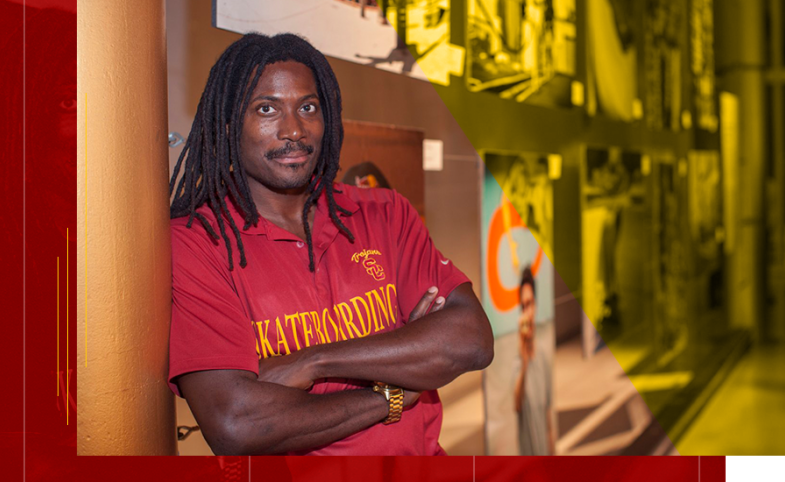
Skateboard Diplomacy
This feature was included in CPD's 2022–2023 Annual Report. View this and other stories here.
Neftalie Williams is an alumnus of the USC Master of Public Diplomacy program, Assistant Professor of Sociology at San Diego State University, and U.S. Sports Envoy for Skateboarding
As a USC undergrad, I was lucky enough to take a class with longtime journalist Robert Scheer. We were talking about the difference between public diplomacy and propaganda. (He had personally witnessed propaganda efforts by the U.S.) He introduced me to Professor Nick Cull, who told me that public diplomacy—unlike propaganda—is a two-way exchange of ideas: encouraging people to feel like they belong to a larger group or have a shared interest. It got me thinking about a passion of mine: skateboarding. Skateboarding is very real culture, with a group identity and burgeoning global community. It occurred to me: nobody has been focusing on skateboarding as a tool of public diplomacy.
These days, I’m the U.S. Sports Envoy for Skateboarding. It involves traveling to different countries and using skateboarding for public diplomacy. My work helps people connect to the U.S. and is very much in line with the mission of the State Department and our foreign embassies: to build strong relationships in foreign lands.
I view my work as related to sports diplomacy, but distinct – because skateboarding is distinct. First and foremost, it doesn’t rely on competition. Yes, you can win a skate contest, but the focus is never “who’s the best” or “who’s number one.” The goal is enjoying yourself, as opposed to winning. Skateboarding also has a “do-it-yourself” (DIY) ethos, where you learn alongside a community of other skaters, without a clear hierarchy. That’s a wonderful, accessible framework when you’re trying to engage with a population.
Moreover, skateboarding as a culture has so many aspects beyond the athletic. I’ve had students tell me: “I’m not a skateboarder, but I’m an artist, and I love the artwork on the bottom of skateboards.” Or, kids with an interest in music get excited about the music in skating videos. There are many ways to be a skater, even if you don’t skate.
As a U.S. Envoy, I’ve conducted missions in the Netherlands—introducing Syrian refugees to skateboarding—as well as Cambodia, Barbados, Grenada, and Kazakhstan. I’ve also worked in Cuba, where we taught people to build their own skateboards, and despite longstanding icy relations between Cuba and the United States, we bonded over skating. Wherever I work, when people discover skateboarding, they get excited. They feel a part of a wider community. It’s a great way for young people to start thinking of themselves as global citizens, and that’s what public diplomacy is all about.
Tags
Visit CPD's Online Library
Explore CPD's vast online database featuring the latest books, articles, speeches and information on international organizations dedicated to public diplomacy.
Popular Blogs
-
January 29
-
January 20
-
December 17
-
January 28
-
January 2







